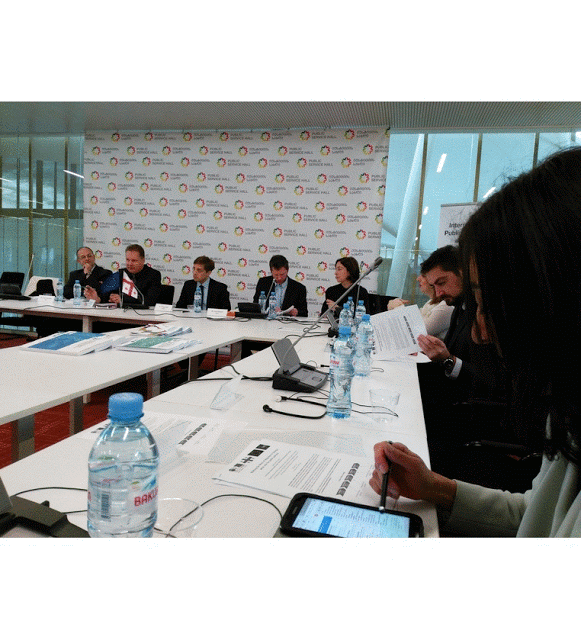From 2013 to 2016, the OECD Development Centre coordinated a EU-funded project on Interrelations between Public Policies, Migration and Development (IPPMD) in ten developing countries including Armenia, Burkina Faso, Cambodia, Costa Rica, Côte d’Ivoire, Dominican Republic, Georgia, Haiti, Morocco and the Philippines. The project collected empirical data to assess the development potential of migration in these countries and develop policy recommendations that would help make the most of this potential. Project findings for Georgia were presented during the launch of the report in Tbilisi on March 28, 2017.

(1)Opening remarks by Mr. Kaido Sirel, Deputy Head of Cooperation, EU Delegation to Georgia.
(2)OECD’s Jason Gagnon presenting major findings of the project in Georgia
(3) CRRC Researcher Mariam Kobaladze and conference participants during a break out session.
In Georgia, IPPMD project’s key partners were the State Commission on Migration Issues of Georgia and CRRC-Georgia. The focus of the project was the impact of emigration, remittances and return migration, on agriculture, the labour market, education and investment/financial services. Within the project, a total of 2260 households were interviewed nationwide, including 972 households with migrant members (current or return international migrants) and 1288 households without such members. In addition, 71 comminity interviews were conducted with representatives of local authorities and community leaders, and 27 semi-structured interviews with stakeholders representing civil society, international organizations and academic institutions.
While, according to the United Nations Department of Economic and Social Affairs (UN DESA), total migrant stock from Georgia decreased through the 2000s, according to the latest census data, 24% of those born in Georgia currently live abroad. As the IPPMD report claims, “[e]migration … can … benefit the country by relieving a congested labour market, providing opportunities for women to increase their economic independence and generating incentives to upgrade skills. However, realising these positive impacts depends on the right conditions being in place,” i.e. efficient evidence-based policies.
The IPPMD survey collected impressive empirical data that allows us to compare emigrant and non-emigrant households in Georgia. Accodring to the IPPMD data, emigrants from Georgia are younger compared to the average age of household members remaining in Georgia – respectively, 42 and 47 years old. Unsurprisingly, 80% of current emigrants are reported to have left in search of work.
IPPMD data also provides interesting and up to date insights about the role of international remittances for households in Georgia. According to the World Bank, remittances constitute 12% of Georgian GDP. About USD 2 billion was estimated to be remitted to Georgia in 2014, up from about USD 300 million in 2004. The development potential of remittances is, however, not fully used, since the remittances are mostly used on consumption or real estate for the households’ personal use. A very small share of remittances is allocated for productive investments. They do, however, tend to increase expenditures on household members’ education.
The IPPMD report argues that the development potential of remittances can be increased if relevant policies are in place. According to the IPPMD findings, households that report receiving remittances are more likely to also have a bank account in urban settlements, but not in rural settlements. This finding calls for the development of the formal banking sector in rural settlements, and also for offering cheaper and faster formal money transfer channels. The report further argues that “[t]raining those who receive remittances in using money transfer operators and financial services more effectively may help to lower the costs and to use remittances in a more productive way. The IPPMD data show that very few households … (1%) have participated in a financial training programme in the past five years.” The so-called social remittances of migration, i.e. knowledge and experiences that the migrants bring back to the country, are no less important, and their role could also be crucial for the country’s development.
The State Commission on Migration Issues of Georgia has been coordinating migration management since 2010. Continuing to integrate migration-related issues into major policy documents, including the national development strategy, and thus developing a more coherent policy framework, will help to use the development potential of migration more effectively.









